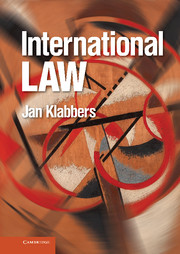Book contents
- Frontmatter
- Contents
- Detailed table of contents
- Table of cases
- Preface
- List of abbreviations
- Part I The structure of international law
- 1 The setting of international law
- 2 The making of international law
- 3 The law of treaties
- 4 The subjects of international law
- 5 Jurisdiction, powers and immunities
- 6 The individual in international law
- 7 The law of responsibility
- 8 International courts and tribunals
- 9 Sanctions, countermeasures and collective security
- Part II The substance of international law
- Part III The surroundings of international law
- Bibliography
- Index
- References
1 - The setting of international law
from Part I - The structure of international law
- Frontmatter
- Contents
- Detailed table of contents
- Table of cases
- Preface
- List of abbreviations
- Part I The structure of international law
- 1 The setting of international law
- 2 The making of international law
- 3 The law of treaties
- 4 The subjects of international law
- 5 Jurisdiction, powers and immunities
- 6 The individual in international law
- 7 The law of responsibility
- 8 International courts and tribunals
- 9 Sanctions, countermeasures and collective security
- Part II The substance of international law
- Part III The surroundings of international law
- Bibliography
- Index
- References
Summary
INTRODUCTION
As anyone who has ever bought a product from abroad should realize, the purchase is possible because there are rules that make it so. As everyone who has ever hopped on an airplane abroad, or sent a postcard abroad or watched a foreign television channel should realize, there are rules that facilitate doing so. These rules form part of a broader network of rules usually referred to as international law. International law is not just the law (if any) that deals with war and peace, or with genocide and human rights; it also encompasses rules on trade, on protection of the environment, on shipping and on the protection of refugees. Few of these rules are uncontroversial, and even fewer work perfectly, but the bottom line should be clear: the existence of international relations, of whatever kind, entails the existence of international law. As the ancient Romans knew, wherever there is a society, there will be law (ubi societas, ibi jus), and the rules regulating contacts within the society of states are generally called international law. It is these rules that form the topic of this book or, more precisely, this book is dedicated to providing a framework for the further study of those rules in detail, since there are far too many international legal rules to fit within the pages of a single volume.
More specifically, this book is dedicated to the study of public international law, as opposed to private international law. Whereas private international law regulates individual conduct with a transboundary element (international contracts, international marriages or international traffic accidents, for example), public international law is often said to regulate relations between states. While saying so is still acceptable, it should be with the caveat that many of the rules of international law have an effect not only on states, but also on other entities, be they companies, individuals or minority groups. Likewise, many of the rules are shaped not just between states but also involve representatives of international organizations (such as the UN), or civil society organizations (such as Greenpeace).
- Type
- Chapter
- Information
- International Law , pp. 3 - 20Publisher: Cambridge University PressPrint publication year: 2013



